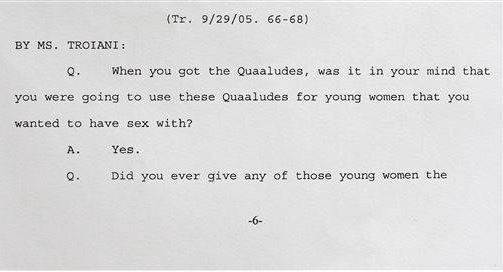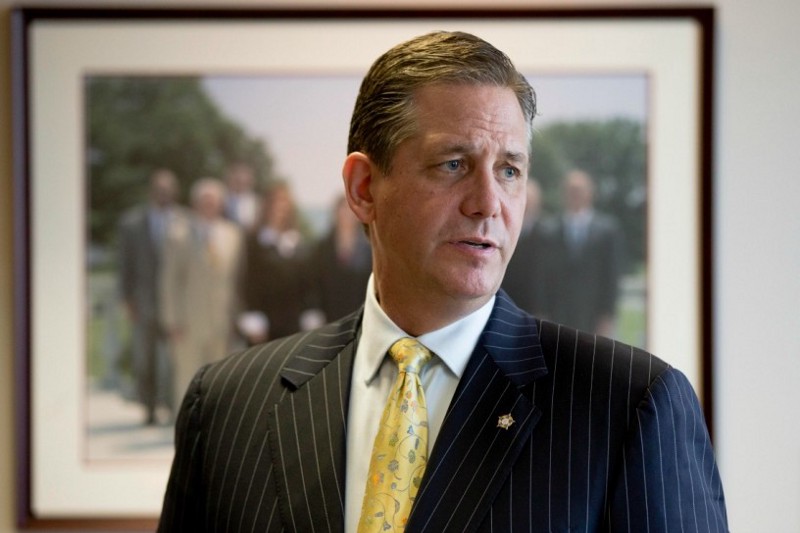The deposition from the Bill Cosby case — you know the one, from 2005, in which Cosby admits to obtaining Quaaludes for women with whom he wanted to have sex — is arguably the most damning piece of evidence against the man who has been accused of sexual misconduct by over 50 women.
At a hearing on Tuesday, Cosby’s legal team is hoping a judge will dismiss the case entirely. If the case should go forward, the prosecution wants the judge to rule that the deposition is inadmissible.

Andrea Constand claims that Cosby drugged and sexually assaulted her in 2004, when she was a Temple University basketball administrator, at his home in Pennsylvania. Cosby is accused of three counts of aggravated indecent assault, a second-degree felony. Cosby says the sexual engagement was consensual. Should Cosby be found guilty, he could face between five and 10 years in prison, plus a $25,000 fine.
Though dozens of women have accused Cosby of sexual assault, and many have filed civil cases against him, Constand’s is the only case to result in criminal charges. Of all of Cosby’s accusers, Constand is the sole individual who brought charges within the statute of limitations. In Pennsylvania, the statute for aggravated indecent assault is 12 years. Cosby was criminally charged on December 30, 2015, just days before the statute was due to run out.
But the hearing isn’t about the alleged assault, exactly: Cosby’s lawyers are citing an alleged agreement between Cosby and Bruce Castor, then Montgomery County district attorney, in which Castor promised Cosby he would not be prosecuted in the Constand case. Castor declined to bring charges against Cosby back in 2005, finding “insufficient credible and admissible evidence.” Constand settled with Cosby in civil court in 2006, and it is Cosby’s testimony from that civil suit which resurfaced late last year.
Cosby’s team asserts that Castor swore he would never prosecute Cosby and that this promise extends to all future holders of the district attorney’s office, including its current occupant, Kevin Steele. As the New York Times reports, it was not Castor’s aim to prevent future prosecution should new evidence emerge, but “in recent emails and other statements, [Castor] said his decision had led Mr. Cosby to testify freely” in Constand’s civil suit, “and therefore that testimony cannot be part of the evidence now being used against him.”

Steele maintains that there is no evidence this agreement ever took place. If it did occur, Steele argues, it would apply only to Castor, not to future district attorneys. Constand’s representation, for their part, say they “were never made aware” of this Castor-Cosby agreement.
That testimony, to say the least, is hugely important to the prosecution’s case. In the face of dozens of sexual assault accusations, Cosby has maintained his innocence. The deposition is the only place, publicly, where Cosby even comes close to confessing to drugging women in order to assault them. (Cosby did not use that language; Dolores M. Troiani, Constand’s lawyer, asked Cosby if he was “going to use these Quaaludes for young women that you wanted to have sex with,” and Cosby said “Yes.”)
Steele is the newly-elected D.A.; he ran against Castor, in an election that saw both candidates invoking the Cosby case as a key part of their respective platforms. Castor assured voters that he would try to bring perjury charges against Cosby: “What I would do is I would get those depositions. I’d have our people tear them apart word-for-word and try to disprove all the facts in there that were material.” Steele, then the assistant D.A., aired television spots that referred to Castor as “a former D.A. who refused to prosecute Bill Cosby.”
READ MORE: The Pennsylvania Election That Reached A Flash Point Over Bill Cosby
Castor has defended his reasoning behind dropping Constand’s case by saying Constand waited too long to go to the police — she reported the assault a year after it allegedly occurred — and that her account to the police was less thorough than the one she later included in her civil complaint. On Tuesday, Castor echoed those earlier statements. As the Philadelphia Inquirer reports, Castor testified to Judge Steven T. O’Neill that he had concerns about Constand’s credibility: “The lack of prompt complaint, the inability to gather forensic evidence from a home or a person was one piece. The contacting of a civil lawyer before going to police was another piece.”
Castor also said that Constand remained in contact with Cosby after the alleged assault and that she secretly recorded some of their phone conversations, a potential violation of state wiretap laws. “Her actions on her own — including going to a lawyer before going to police — had created a credibility issue for her that could never be improved upon. I did not think there was any possibility that the case would get better.”
Judge Steven T. O’Neill could dismiss the entire case, decline to throw out Constand’s case but still rule the deposition inadmissible, or allow the case to move forward and allow Cosby’s testimony to be included.
According to the Philadelphia Inquirer, O’Neill excepts the hearing to continue through Wednesday.
